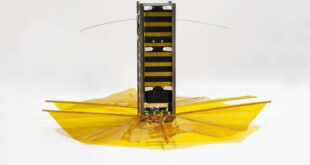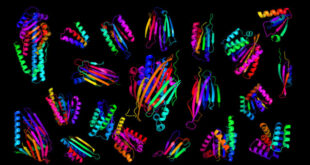Scientists have long known that immune cells migrate to the site of an infection, which individuals experience as inflammation. Now, a team of researchers at the University of Washington and Northwestern University has uncovered evidence that this gathering is not just a consequence of immune activation; immune cells ‘count’ how many of them have gathered to determine how much the immune system should react.
Immune cells count their neighbors before deciding whether or not the immune system should kick into high gear. Image credit: Northwestern University.
“This is a previously unrecognized aspect of immune function. The cells make a coordinated decision. They don’t uniformly activate but instead collectively decide how many cells will activate, so that together, the system can fend off a threat without dangerously overreacting,” said Northwestern University’s Professor Joshua Leonard.
“A key part of this work relied on the development of new computational models to interpret our experiments and elucidate how cells perform calculations to make coherent decisions,” added University of Washington’s Dr. Neda Bagheri.
The body’s immune system works constantly to maintain a delicate balance. When a threat is introduced, the system needs to respond strongly enough to fight off infection or disease, but not so strongly that it causes harm.
The researchers wanted to better understand how the immune system makes these types of decisions.
“It’s especially interesting because the immune system is decentralized,” said Joseph Muldoon, a graduate student at Northwestern University.
“Immune cells are individual agents that need to work together, and nature has come up with a solution for how they can get on the same page. Cells arrive at different activation states, but in such a way that, on the whole, the population response is calibrated.”
To explore this phenomenon, the scientists examined macrophages, a type of immune cell that is part of the first line of defense for combatting infection and disease.
They observed how macrophages responded to a chemical produced by bacteria — a red flag that alerts the body to the presence of infection — using techniques that enabled the team to watch individual cells’ responses over time.
The authors then used computational models to help interpret and explain these observations.
Immune cells were ‘counting’ how many of them had gathered to determine how much the system should react.
“Over time, the cells observe their surroundings to get a sense of their neighbors,” Muldoon said.
“Each cell becomes poised to respond as a high activator or not. Now that we know there’s this additional layer controlling the immune system, it opens up a whole avenue to study whether there are new targets for immunomodulation.”
The researchers believe this information could be used to develop improved cancer immunotherapies or treatments for autoimmune diseases, help design better drugs and guide the engineering of advanced cell-based therapies.
“Biology has evolved so many fascinating and surprising ways to control complex processes,” Professor Leonard said.
“As synthetic biologists, we work to engineer cells to perform customized therapeutic functions, such as activating the immune system locally at a tumor site but not throughout the patient. Understanding nature’s innovations helps us to come up with new designs and enables us to be better engineers.”
The findings appear in the journal Nature Communications.
_____
J.J. Muldoon et al. 2020. Macrophages employ quorum licensing to regulate collective activation. Nat Commun 11, 878; doi: 10.1038/s41467-020-14547-y
 #Bizwhiznetwork.com Innovation ΛI |Technology News
#Bizwhiznetwork.com Innovation ΛI |Technology News




